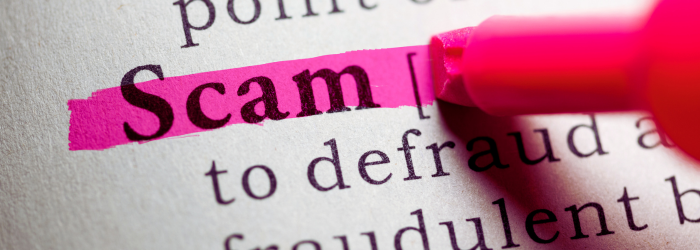Laura Holleman
Updated 4:09 PM CST, Mon November 25, 2024
Published Under: Cybersecurity General Identity Protection

Scams are on the rise, and unfortunately, fraudsters are getting more sophisticated in their tactics. At Security Bank USA, protecting our customers is a top priority, and education is one of the most effective tools we have to combat fraud. Knowing how to recognize a scam can save you from potential financial loss and stress. Let’s review the common signs of a scam, how you can protect yourself, and what to do if you think you've been targeted.
1. Recognize the Red Flags
Fraudsters are masters at playing on emotions and urgency. Here are some red flags to watch out for:
a. Unsolicited Contact
If someone contacts you unexpectedly, whether through a phone call, email, or text message, be cautious—especially if you don’t know them. Banks or legitimate businesses rarely reach out asking for sensitive information without prior engagement.
b. Too Good to Be True Offers
If it seems too good to be true, it probably is. This includes winning a contest you never entered or getting an unbelievable deal that requires immediate action. Scammers often use enticing offers to lower your guard.
c. Pressure to Act Immediately
Scammers frequently create a false sense of urgency. They might say your bank account has been compromised, or you’ll lose a fantastic deal if you don’t respond quickly. This pressure is a tactic to get you to act without thinking.
d. Requests for Personal Information
Be wary of any communication asking for your personal information, like Social Security numbers, account numbers, or passwords. Legitimate companies, including banks, will never ask for this information over the phone, email, or text.
e. Payment Requests via Unusual Methods
Requests for payment through gift cards, cryptocurrency, or wire transfers are huge red flags. Scammers prefer these methods because they are harder to trace.
2. Common Types of Scams
Here are some common scams to be aware of:
a. Phishing Emails and Texts
These scams involve fake emails or text messages designed to look like they come from a trusted source. They often include links that, when clicked, lead to malicious websites designed to steal your information.
b. Impersonation Scams
Scammers may impersonate a bank representative, government official, or even a relative in need of urgent help. They often use fear or sympathy to manipulate victims.
c. Online Shopping Scams
You might see a product online at a fantastic price, but once you pay, the product never arrives. Be cautious of unfamiliar websites and always read reviews.
d. Investment Scams
Promises of high returns with little risk are often scams. Be cautious of unsolicited offers to invest in stocks, bonds, or cryptocurrency.
3. How to Protect Yourself
Here are some steps you can take to safeguard your finances and personal information:
a. Verify Before Trusting
If you receive a suspicious call, email, or message, verify the information through official channels. Call the company directly using the number on their official website, not the one provided in the message.
b. Use Strong Passwords and Multi-Factor Authentication
Ensure your accounts are secure by using strong, unique passwords. Enable multi-factor authentication (MFA) where possible for an added layer of security.
c. Monitor Your Accounts Regularly
Keep a close eye on your bank accounts, credit cards, and other financial accounts. Set up alerts for unusual transactions and report anything suspicious immediately.
d. Be Skeptical of Unsolicited Offers
If someone contacts you with an offer you weren’t expecting, it’s okay to be skeptical. Take your time, do your research, and never rush into a decision.
e. Shred Sensitive Documents
Don’t just throw away bank statements or documents with personal information. Shred them to prevent dumpster divers from gaining access to sensitive data.
4. What to Do if You Think You've Been Scammed
If you believe you may have fallen victim to a scam, act quickly:
a. Contact Security Bank USA Immediately
Call your bank to report the incident and take steps to secure your accounts. We can help block your cards, issue new ones, and monitor for any suspicious activity.
b. File a Report with the Authorities
Report the scam to the Federal Trade Commission (FTC) or your local authorities. This can help prevent others from falling victim to the same scam.
c. Consider a Fraud Alert or Credit Freeze
If your identity has been compromised, consider placing a fraud alert or credit freeze on your credit report to prevent scammers from opening new accounts in your name.
5. Stay Informed and Educated
The best way to prevent scams is by staying informed. Keep up to date with the latest fraud trends, and share what you learn with friends and family. Our bank is here to help—if you ever have questions or concerns, don’t hesitate to reach out.
Your Security Is Our Priority
Scammers are constantly evolving their methods, but by staying vigilant and taking proactive steps, you can protect yourself. At Security Bank, we are committed to safeguarding your financial well-being. Remember, if something feels off, trust your instincts, and when in doubt, reach out to us for guidance.
Feel free to stop by one of our branches, give us a call, or visit our website to learn more about how we’re keeping your money safe. Together, we can outsmart scammers and keep your finances secure!
Comments